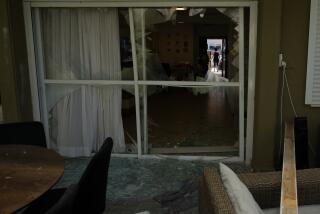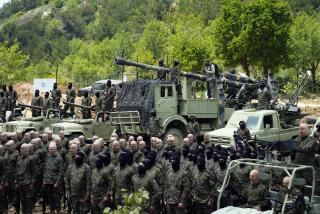Syrian Gunboats Tighten Blockade of Christian Ports in Lebanon; Land Siege Lifted
BEIRUT — Syria sent gunboats Tuesday to tighten its blockade of Lebanon’s Christian enclave in a move likely to set back Arab efforts to end the 14-year-old civil war.
Security sources said six Syrian warships, cruising eight miles off the Christian enclave, searched two cargo ships to make sure they were not carrying arms for the Christian army commander, Maj. Gen. Michel Aoun, who heads one of two rival Lebanese governments.
The deployment was the first Syrian use of ships to enforce the blockade imposed in mid-March, and sources close to Aoun said it could lead to naval clashes.
Syria and its Muslim allies announced Monday that they would lift their land siege of the Christian enclave and reopen the airport in Muslim West Beirut as a good-will gesture to help peace efforts by a three-nation Arab committee.
But they said they would maintain the blockade of Aoun’s ports, enforced until now by artillery shelling. Aoun was quoted Monday as saying he is still receiving arms despite the shelling.
Security sources said that although Beirut airport is now technically open, the Lebanese carrier Middle East Airlines will not resume flights until Christian leaders pledge not to shell it.
Muslim political sources said Christian forces had vowed to continue shelling the airport as long as Syria maintains its sea blockade.
One Christian political source said: “We will not accept that Beirut airport reopens while the Syrian sea blockade is still isolating Christian areas from the outside world.”
Aoun, locked in a bloody feud with Syria and its allies since mid-March, has previously linked the reopening of the airport to an end to the port blockade.
Witnesses said civilian cars drove in both directions through the Museum crossing on the so-called Green Line between Christian East and Muslim West Beirut when barriers were removed at noon.
It was the first time such vehicles have been able to move freely within the divided city since Syria and its Muslim militia allies sealed off the Christian heartland March 21.
Police said blocked roads north and east were also reopened at noon, and trucks with supplies for the beleaguered 500,000 residents of the Christian sector were due to arrive soon.
Syria’s Muslim allies announced Monday a unilateral cease-fire in their battle with Aoun’s mainly Christian troops and an end to the land siege.
The move followed efforts by the foreign ministers of Saudi Arabia, Morocco and Algeria in Damascus, Syria, and Baghdad, Iraq, to stop the fighting as the first stage of an Arab League peace plan for Lebanon.
Witnesses said Aoun’s troops responded by lifting restrictions on cars driving through their checkpoints between the Christian enclave and Syrian-controlled territory.
Appeal to East Beirut
“We appeal to our brothers in East Beirut to accept this step as a positive and important one toward reaching a solution,” said Salim Hoss, the Sunni Muslim leader who controls the Syrian-backed Muslim government that rivals Aoun’s.
Hoss issued a statement saying: “Any objection to this means a determination to continue importing arms, and there is no justification for this.”
In Damascus, Syria praised the decision by its allies but made no mention of the unilateral cease-fire.
Sources close to Aoun, who has vowed to expel Syria’s estimated 40,000 troops from Lebanon, dismissed the cease-fire announcement. Any solution to the Lebanese crisis would require direct talks with Damascus, they said.
Muslim political sources told a reporter that Syria had asked the three-member Arab committee to ensure the withdrawal of Soviet-made surface-to-surface missiles from Aoun’s army.
The missiles have a 40-mile range, making them capable of hitting Damascus from Aoun’s Christian enclave, they said. Iraq, Syria’s most vehement Arab opponent, had supplied them, the sources added.
The sources said the committee still sought guarantees from Baghdad and Damascus that they would not send arms to Lebanon.
More to Read
Sign up for Essential California
The most important California stories and recommendations in your inbox every morning.
You may occasionally receive promotional content from the Los Angeles Times.










